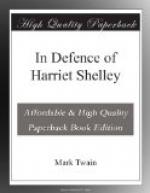“In
this piteous appeal Shelley declares that he has now
no
grief
but one—the grief of having known and lost
his wife’s
love.”
Exhibit F
“Thy
look of love has power to calm
The
stormiest passion of my soul.”
But without doubt she had been reserving her looks of love a good part of the time for ten months, now—ever since he began to lavish his own on Cornelia Turner at the end of the previous July. He does really seem to have already forgotten Cornelia’s merits in one brief month, for he eulogizes Harriet in a way which rules all competition out:
“Thou
only virtuous, gentle, kind,
Amid
a world of hate.”
He complains of her hardness, and begs her to make the concession of a “slight endurance”—of his waywardness, perhaps—for the sake of “a fellow-being’s lasting weal.” But the main force of his appeal is in his closing stanza, and is strongly worded:
“O
tract for once no erring guide!
Bid
the remorseless feeling flee;
’Tis
malice, ’tis revenge, ’tis pride,
’Tis
anything but thee;
I
deign a nobler pride to prove,
And
pity if thou canst not love.”
This is in May—apparently towards the end of it. Harriet and Shelley were corresponding all the time. Harriet got the poem—a copy exists in her own handwriting; she being the only gentle and kind person amid a world of hate, according to Shelley’s own testimony in the poem, we are permitted to think that the daily letters would presently have melted that kind and gentle heart and brought about the reconciliation, if there had been time but there wasn’t; for in a very few days—in fact, before the 8th of June—Shelley was in love with another woman.
And so—perhaps while Harriet was walking the floor nights, trying to get her poem by heart—her husband was doing a fresh one—for the other girl —Mary Wollstonecraft Godwin—with sentiments like these in it:
Exhibit G
To spend years thus and be rewarded, As thou, sweet love, requited me When none were near. . . . thy lips did meet Mine tremblingly; . . ,
“Gentle
and good and mild thou art,
Nor
can I live if thou appear
Aught
but thyself.” . . .
And so on. “Before the close of June it was known and felt by Mary and Shelley that each was inexpressibly dear to the other.” Yes, Shelley had found this child of sixteen to his liking, and had wooed and won her in the graveyard. But that is nothing; it was better than wooing her in her nursery, at any rate, where it might have disturbed the other children.
However, she was a child in years only. From the day that she set her masculine grip on Shelley he was to frisk no more. If she had occupied the only kind and gentle Harriet’s place in March it would have been a thrilling spectacle to see her invade the Boinville rookery and read the riot act. That holiday of Shelley’s would have been of short duration, and Cornelia’s hair would have been as gray as her mother’s when the services were over.




